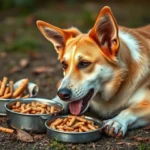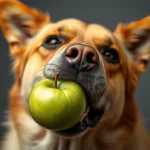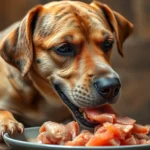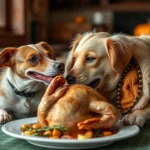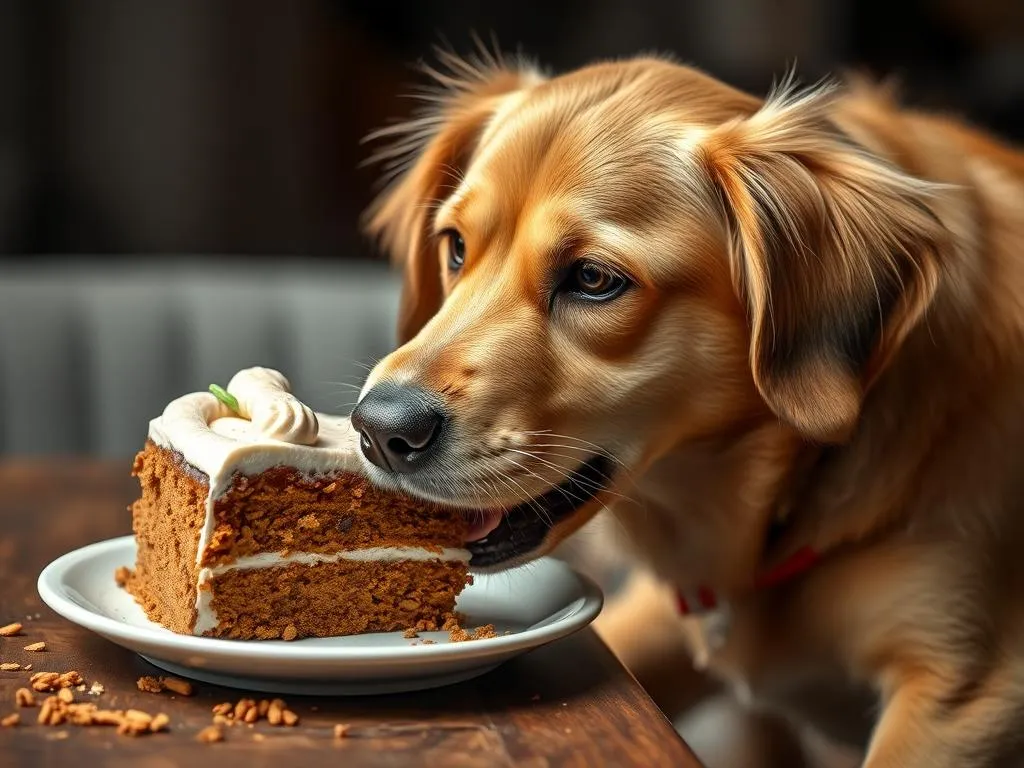
Introduction
Understanding the intricacies of dog nutrition is essential for every pet owner. Just like humans, dogs require a balanced diet to thrive. This means incorporating the right mix of proteins, carbohydrates, fats, vitamins, and minerals into their meals. However, many misconceptions surround what dogs can and cannot eat, leading to confusion when sharing human foods with our furry friends.
One common question that arises is: Can dogs eat carrot cake? To address this, it’s crucial to explore the nutritional elements of carrot cake and determine whether it is safe for dogs. By understanding which human foods are safe for dogs, we can make informed decisions about our pets’ diets.
Understanding Dog Nutrition
Essential Nutrients for Dogs
Dogs, like any other living beings, require a variety of nutrients to maintain optimal health. Here’s a breakdown of the essential nutrients that should be part of a dog’s diet:
- Proteins: Necessary for growth, repair, and overall health. They play a crucial role in maintaining muscle mass and supporting the immune system.
- Carbohydrates: Provide energy and support digestive health through fiber. While not as essential as proteins, they can be beneficial in moderation.
- Fats: Source of concentrated energy and essential fatty acids. Fats also help absorb fat-soluble vitamins and support healthy skin and coat.
- Vitamins and Minerals: Vital for various bodily functions, including bone health, immune function, and metabolic processes. Specific vitamins and minerals are required in small amounts for overall health.
Common Nutritional Risks
While it’s important to ensure a balanced diet for dogs, there are several risks associated with improper feeding practices:
- Overfeeding and Obesity: Dogs can easily gain weight if their portions are not monitored. Obesity can lead to severe health issues, including diabetes, joint problems, and heart disease.
- Toxic Foods for Dogs: Certain human foods, such as chocolate, grapes, and onions, can be highly toxic to dogs. It’s important to be aware of these to prevent accidental poisoning.
- Nutritional Deficiencies: Feeding dogs an unbalanced diet can lead to deficiencies, which may cause health problems over time.
Carrot Cake Ingredients
Common Ingredients in Carrot Cake
Carrot cake is a beloved dessert that typically contains a variety of ingredients. Here’s a list of common components:
- Carrots: The star ingredient, known for its health benefits.
- Sugar: Adds sweetness but can be harmful in large quantities.
- Flour: Provides structure to the cake.
- Eggs: A source of protein and moisture.
- Nuts (e.g., walnuts, pecans): Often included for texture and flavor, but some nuts can be toxic to dogs.
- Spices (e.g., cinnamon, nutmeg): Used for flavor; however, some spices can be harmful in excess.
- Frosting (cream cheese, butter): Adds richness but is high in sugar and fat.
Nutritional Analysis of Carrot Cake
When considering whether dogs can eat carrot cake, it’s essential to analyze its nutritional profile.
- Calories and Nutrients: A typical slice of carrot cake can range from 300 to 500 calories, depending on the ingredients and portion size.
- Benefits of Carrots for Dogs: Carrots are low in calories and high in fiber and vitamins, particularly vitamin A, which promotes good vision and skin health. They can be a healthy snack for dogs.
- Risks of Sugar and Unhealthy Fats: The high sugar content in carrot cake can lead to obesity, dental problems, and even diabetes in dogs. Unhealthy fats from frosting can also contribute to weight gain and gastrointestinal issues.
Can Dogs Eat Carrot Cake?
Safe Ingredients for Dogs
While carrot cake may not be a suitable treat for dogs in its traditional form, some ingredients are safe and beneficial:
- Carrots: Dogs can safely eat carrots, which are low in calories and high in fiber. They can also help clean dogs’ teeth when chewed. It’s best to serve them in small, manageable pieces, either raw or cooked.
- Other Dog-Safe Ingredients: Eggs and plain flour can be safe in moderation. However, avoid any ingredients that could be harmful to dogs.
Potential Risks of Carrot Cake
Despite some safe ingredients, there are potential risks associated with feeding carrot cake to dogs:
- High Sugar Content: The sugar in carrot cake can lead to obesity and other health problems. Dogs do not require sugar in their diets, and excessive intake can cause gastrointestinal upset.
- Toxic Ingredients: Some carrot cakes may contain chocolate or certain nuts like macadamia nuts, which are toxic to dogs. Always check the recipe before sharing.
- Allergies and Sensitivities: Just like humans, dogs can have allergies or sensitivities to specific ingredients, including wheat, nuts, or eggs. Monitor for any adverse reactions if you do choose to share a small piece of carrot cake with your dog.
Portion Control and Moderation
If you decide to allow your dog to try carrot cake, it’s imperative to practice portion control:
- Recommended Serving Sizes: A small piece, approximately 1-2 tablespoons, may be acceptable for larger dogs, while smaller dogs should have even less. Always consider your dog’s size and dietary needs.
- Signs of Overindulgence: Keep an eye out for symptoms like lethargy, upset stomach, or diarrhea, which could indicate that your dog has eaten too much.
Alternatives to Carrot Cake for Dogs
Healthy Homemade Dog Treats
If you want to treat your dog to something special, consider making healthy homemade treats. Here are a couple of simple recipes:
- Carrot and Peanut Butter Dog Treats:
- Ingredients: 1 cup grated carrots, 1/2 cup peanut butter (unsweetened), and 2 cups whole wheat flour.
-
Instructions: Mix ingredients, roll into small balls, and bake at 350°F for 15-20 minutes.
-
Apple and Oat Dog Biscuits:
- Ingredients: 1 cup unsweetened applesauce, 1 cup oats, and 1 cup whole wheat flour.
- Instructions: Combine, roll out, and cut into shapes before baking at 350°F for 20-25 minutes.
Benefits of Homemade Treats vs. Store-Bought: Homemade treats allow you to control the ingredients, ensuring they are safe and nutritious for your dog. Store-bought treats can contain preservatives and additives that may not be suitable for your pet.
Store-Bought Dog Treats
If you prefer store-bought options, there are plenty of healthy treats available:
- Natural Dog Treats: Look for brands that use whole ingredients without artificial additives or preservatives.
- How to Read Labels: Always check the ingredient list. Avoid treats with high sugar content or any harmful ingredients like chocolate, xylitol, or unhealthy fats.
Conclusion
In summary, while the question can dogs eat carrot cake is intriguing, the answer is nuanced. While certain ingredients like carrots can be beneficial for dogs, the high sugar and fat content in traditional carrot cake make it less than ideal for our furry companions. Moderation is key, and it’s essential to be aware of the potential risks associated with sharing human food with dogs.
Ultimately, it’s best to focus on providing a balanced diet specifically tailored for dogs, supplemented with safe fruits and vegetables in moderation. Always consult your veterinarian for guidance tailored to your dog’s specific dietary needs and restrictions.
FAQ (Frequently Asked Questions)
Can dogs eat other types of cake?
Most cakes are high in sugar and unhealthy fats, making them unsuitable for dogs. It’s best to avoid sharing cake, but you can make dog-friendly versions using safe ingredients.
What human foods are safe for dogs?
Many fruits and vegetables are safe for dogs, including carrots, apples, blueberries, and green beans. Always research any new food before sharing it with your dog.
How can I tell if my dog has eaten something harmful?
If your dog displays symptoms like vomiting, diarrhea, lethargy, or unusual behavior after eating something new, contact your veterinarian immediately.
What are signs of a food allergy in dogs?
Signs of food allergies in dogs include itching, skin irritations, gastrointestinal upset, and ear infections. If you suspect your dog has a food allergy, consult your veterinarian for guidance.
By understanding dog nutrition and being mindful of what you share with your pet, you can ensure a happier, healthier life for your furry friend.
